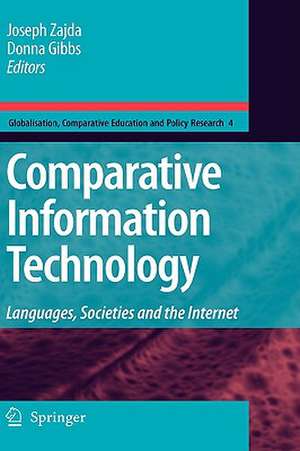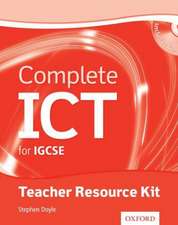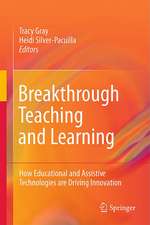Comparative Information Technology: Languages, Societies and the Internet: Globalisation, Comparative Education and Policy Research, cartea 4
Editat de Joseph Zajda, Donna Gibbsen Limba Engleză Hardback – 21 apr 2009
| Toate formatele și edițiile | Preț | Express |
|---|---|---|
| Paperback (1) | 635.15 lei 43-57 zile | |
| SPRINGER NETHERLANDS – 31 mar 2011 | 635.15 lei 43-57 zile | |
| Hardback (1) | 641.20 lei 43-57 zile | |
| SPRINGER NETHERLANDS – 21 apr 2009 | 641.20 lei 43-57 zile |
Din seria Globalisation, Comparative Education and Policy Research
- 24%
 Preț: 731.71 lei
Preț: 731.71 lei - 20%
 Preț: 753.41 lei
Preț: 753.41 lei - 18%
 Preț: 780.57 lei
Preț: 780.57 lei - 15%
 Preț: 643.84 lei
Preț: 643.84 lei - 15%
 Preț: 636.63 lei
Preț: 636.63 lei - 15%
 Preț: 636.80 lei
Preț: 636.80 lei - 15%
 Preț: 637.28 lei
Preț: 637.28 lei - 15%
 Preț: 642.83 lei
Preț: 642.83 lei -
 Preț: 389.11 lei
Preț: 389.11 lei - 15%
 Preț: 643.00 lei
Preț: 643.00 lei - 15%
 Preț: 583.45 lei
Preț: 583.45 lei - 15%
 Preț: 646.62 lei
Preț: 646.62 lei - 24%
 Preț: 694.97 lei
Preț: 694.97 lei - 18%
 Preț: 731.59 lei
Preț: 731.59 lei - 15%
 Preț: 644.82 lei
Preț: 644.82 lei - 18%
 Preț: 939.77 lei
Preț: 939.77 lei - 15%
 Preț: 635.31 lei
Preț: 635.31 lei - 18%
 Preț: 941.82 lei
Preț: 941.82 lei - 18%
 Preț: 994.39 lei
Preț: 994.39 lei - 18%
 Preț: 724.80 lei
Preț: 724.80 lei - 18%
 Preț: 886.43 lei
Preț: 886.43 lei - 18%
 Preț: 887.86 lei
Preț: 887.86 lei - 18%
 Preț: 777.35 lei
Preț: 777.35 lei - 15%
 Preț: 642.51 lei
Preț: 642.51 lei - 18%
 Preț: 781.45 lei
Preț: 781.45 lei - 18%
 Preț: 775.65 lei
Preț: 775.65 lei - 18%
 Preț: 938.66 lei
Preț: 938.66 lei
Preț: 641.20 lei
Preț vechi: 754.36 lei
-15% Nou
Puncte Express: 962
Preț estimativ în valută:
122.70€ • 128.43$ • 102.12£
122.70€ • 128.43$ • 102.12£
Carte tipărită la comandă
Livrare economică 31 martie-14 aprilie
Preluare comenzi: 021 569.72.76
Specificații
ISBN-13: 9781402094255
ISBN-10: 1402094256
Pagini: 200
Ilustrații: 200 p.
Dimensiuni: 155 x 235 x 20 mm
Greutate: 0.44 kg
Ediția:2009
Editura: SPRINGER NETHERLANDS
Colecția Springer
Seria Globalisation, Comparative Education and Policy Research
Locul publicării:Dordrecht, Netherlands
ISBN-10: 1402094256
Pagini: 200
Ilustrații: 200 p.
Dimensiuni: 155 x 235 x 20 mm
Greutate: 0.44 kg
Ediția:2009
Editura: SPRINGER NETHERLANDS
Colecția Springer
Seria Globalisation, Comparative Education and Policy Research
Locul publicării:Dordrecht, Netherlands
Public țintă
ResearchCuprins
Comparative Information Technology: Languages, Societies and the Internet.- Abstract Tools and Technologies of Learning: An Evolving Partnership.- E-Learning in Schools: Making Successful Connections.- What is Needed For Global E-Learning in Higher Education.- Mobile Learning: The Significance of New Mobile and Wireless Communications Technologies for Education.- Connecting Schools to their Communities: The South-East Asian Experience.- Digital Literacy and Activity Systems in Adolescents.- Digital Literacy and Using Online Discussions: Reflections from Teaching Large Cohorts in Teacher Education.- Development of IT-Infrastructure for Rural Connectivity: A Pro-poor Approach to E-Governance for Rural Development in India.- Context Is Everything: An International Perspective of, and Its Challenges to, Research and the Evaluation of Educational Technology.
Textul de pe ultima copertă
This volume offers a critique of the nexus between ICT and its impact on society, individuals and educational institutions. One of the most significant dimensions of globalisation has been the rapid development of information and communications technologies (ICTs). Our lives have been changed by ICTs in numerous ways and the implications for education are enormous. The ICTs have transformed the linguistic, cognitive and visual dimensions of human communication, as well as our perceptions of the self, and social identity in the global culture. They have facilitated the development of new dimensions of digital literacy, such as blogging and sms messaging. In this sense, cyberlanguage continues to evolve by borrowing and adapting familiar words, coining new expressions, and embracing particular styles.
The book provides directions in education and policy research, relevant to transformational educational reforms in the 21st century.
The book provides directions in education and policy research, relevant to transformational educational reforms in the 21st century.
Caracteristici
Examines recent research dealing with ICT, cultural identity and pedagogy Explores conceptual frameworks and methodological approaches applicable in the research of ICT, globalisation and pedagogy Demonstrates ideological imperatives of technodeterminism affecting cultural identity and pedagogy Provides strategic education policy analysis on recent developments in information technology and cultural identity research Gives suggestions for directions in education and policy changes, relevant to democratic and empowering pedagogy in the 21st century



